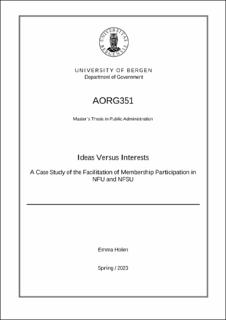Ideas Versus Interests: A Case Study of the Faciliation of Membership Participation in NFU and NFSU
Master thesis
Permanent lenke
https://hdl.handle.net/11250/3081714Utgivelsesdato
2023-06-03Metadata
Vis full innførselSamlinger
- Master theses [88]
Sammendrag
This qualitative case study explores how interest organizations facilitate membership participation. Executed by understanding how NFU and NFSU form ideas and interests in the agricultural settlement in Norway. This involves researching the participation process in NFU and NFSU which takes place each year. In this process, ideas and interests are collected and assembled into a demand presented in the agricultural negotiations. Thus, the organizational behavior this thesis tries to understand is the facilitation of participation. Since NFU and NFSU are regarded as institutions, their behavior is understood through institutional theory. Particularly the normative and rational choice theory. In this sense, the facilitation is explained by the norms, values, and structure of the organizations. The facilitation of participation is measured through the four dimensions; level, form, range, and degree. To unravel how the participation is facilitated eight semi-structured interviews and 25 documents are collected. Moreover, the thesis is concentrated on the period from 2020 to 2023. This thesis found that normative and rational characteristics of NFU and NFSU are part of explaining the participation facilitated in forming ideas and interests. The normative characteristics in NFU are democratic responsibility, common interest, and compromises. While the rational features display a democratic structure restricted by the number of members. The normative characteristics of NFSU display democratic responsibility, grassroots, and principled. The rational features also display a democratic structure but are affected by active members. The participation structure in both NFU and NFSU displays democratic structures with high dimensions of level, form, range, and degree. Differences are observed in that NFU has more of a specific and summarized process guiding the members. The process at NFSU is more influenced by many actors and big questions, with more power to the members. The different values evident in NFU and NFSU reflect the interests advanced. In this sense, the interests advanced by NFU are concerned with external interests and thus often end in agreement. The interests advanced by NFSU are concerned with the internal interests of the organizations, and thus more often end in a breach. Hence, how NFU and NFSU facilitate participation is influenced by the institutional characteristics. In this sense, NFU does facilitate participation concerning democratic responsibility and is guided by external interests. NFSU facilitates participation concerning democratic responsibility and is guided by internal interests.
